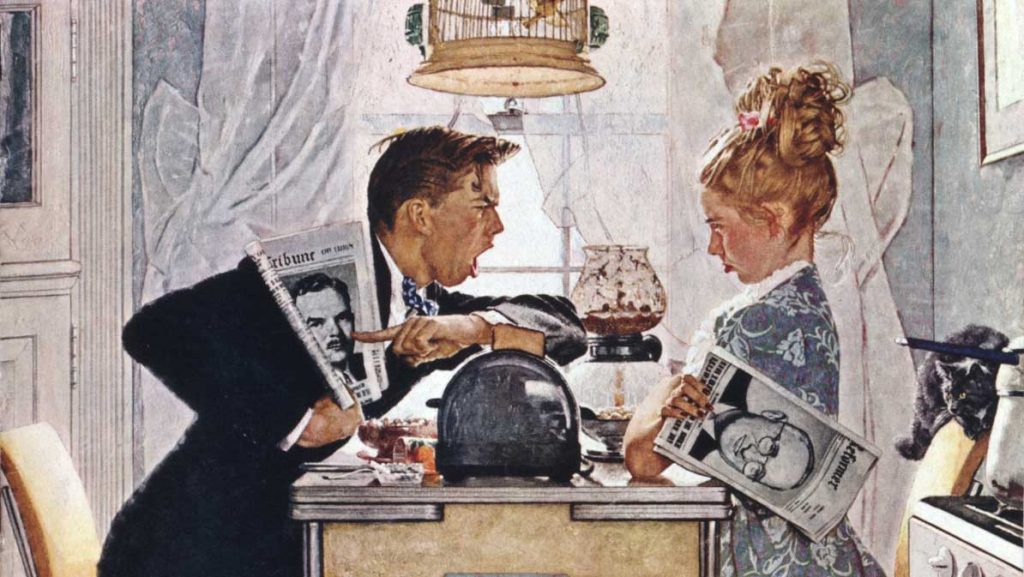Blog Post
Why you shouldn’t let partisanship poison your brain
By Jonathon Van Maren
I’ve been reading a lot of Malcolm Muggeridge lately after being introduced to his magnificent memoir and becoming fascinated by his approach to politics. The past year has been relentless and exhausting for anyone who follows the news cycle closely, with polarization, partisanship, and pandemic news, theories, and counter-theories torquing everything and straining common bonds to the breaking point. Muggeridge’s approach to politics, which combined a detached sense of the absurd and an acute awareness of civilizational catastrophe, seems like one way to stay sane.
Considering the political unravellings of the past year, detached awareness is looking increasingly appealing. Hypocrisy has always been a fundamental characteristic of political partisanship—we tend to excuse the things our guys do while loudly condemning the things the other guys do because we generally believe that our side is the right side. Thus, calling out our own side seems counter-productive, because we could hurt the good guys and thus the common good. This is obviously nothing new. It does, however, seem that political partisanship in our populist age has become more nakedly and brazenly hypocritical in that we no longer even pretend to be outraged when our side does the things that we fulminate over when the other side does them.
I don’t think that this is Donald Trump’s fault. Trump was, as Tucker Carlson and others frequently point out, a symptom of polarization who exacerbated these trends but certainly didn’t start them. He was merely the one who ripped the Band-Aid off and exposed the farce of modern partisan politics in the media age for what it is—and did so crudely and unapologetically. Trump denied us our illusions. We liked to pretend that we had a long list of principles that we would never compromise. Trump forced us to reveal which of those priorities we truly cared about by speaking, tweeting, behaving, and governing so crudely and chaotically that we had to explain why voting for him was worth it. Some eventually decided that Trump was a good man and a great president—this was revealing, as well.
Any conservative who was alive during the Obama era—which is all of them—knows for a fact that a Democratic president would have been crucified by the right-wing press for many of the things Trump did. For his statements on murderous dictators from Kim Jong Un to Xi Jinping. For giving away state secrets. For trashing dozens of conservative orthodoxies (some of which, admittedly, had to go, but were defended fiercely fifteen minutes ago.) The list is endless; the chaos was constant. If a Democratic president had governed or behaved the way Trump did, Sean Hannity would likely have blown up on air like a hand grenade.
The same is true for the Democrats. Executive orders were great when Obama used them; evil when Trump did; they’re awesome again with Biden signing stacks so high he doesn’t even know what’s in them. His long history of provable corruption doesn’t matter. Neither does his history of plagiarism. “Believe Women” died when Tara Reade accused Biden of sexual assault. Joe Biden would have failed the Joe Biden standard on sexual assault that he promoted for university campuses, but nobody cares because asking questions might have helped Trump. And then there is the insane suppression of the Hunter Biden story in the New York Post. Press freedom was only essential while Trump was president.
Dozens of fat books are being written about how to heal from hyper-polarization, from David French’s Divided We Fall: America’s Secession Threat and How to Restore Our Nation to Robert Putnam and Shaylyn Garret’s 2020 tome The Upswing: How America Came Together a Century Ago and How We Can Do It Again. I’m not optimistic—we can’t even agree on the definition of “man” and “woman” anymore, and the competing visions of America are so opposed to one another that it is difficult to see where common ground can be found on these issues. Senator Ben Sasse has some compelling ideas in his book Them: Why We Hate Each Other and How to Heal, but he is now hated by much of the GOP base over his refusal to remain silent about Trump’s faults. Sasse’s predicament is a good microcosm of where we’re at, and it isn’t a pretty picture. Honesty isn’t welcome.
None of this is to say that we shouldn’t remain vigilant; that we should be uninvolved in politics, or that politics are unimportant. Unfortunately, I think politics are more important now than ever because the stakes are so high. You might be disinterested in politics—politics will not be disinterested in you. But I do think that a sense of the absurd and a detachment that refuses to allow politics to dominate our minds might make all this more palatable, and might stop us from going completely crazy. It’s worth a shot, anyway.








